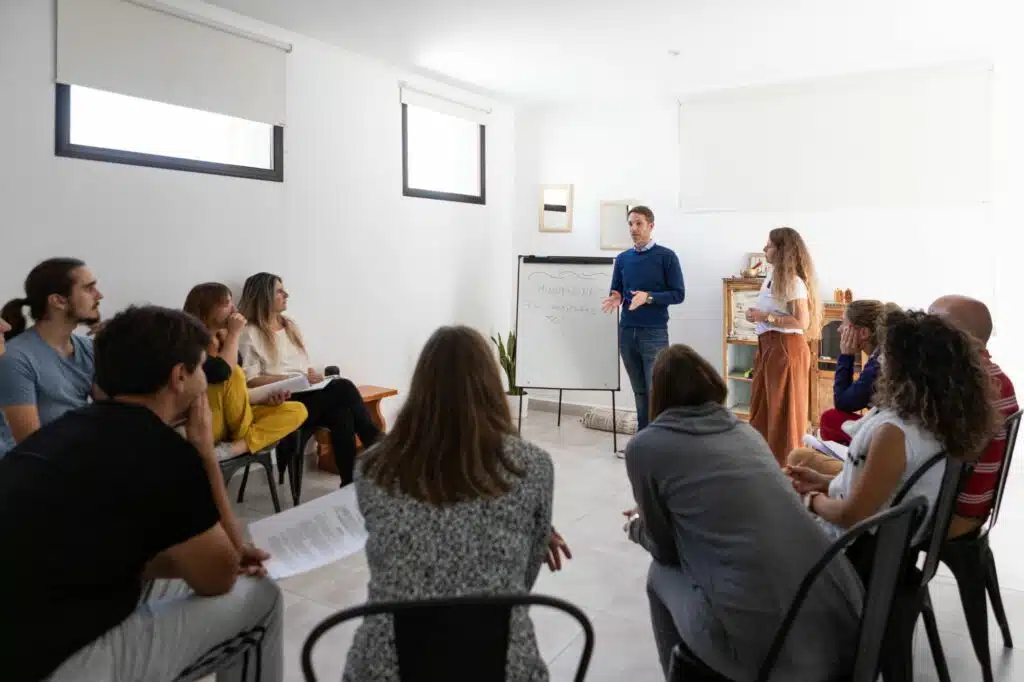Table of Contents
Mindfulness-Based Cognitive Therapy (MBCT) combines mindfulness practices with cognitive behavioral strategies to increase self-awareness and acceptance of thoughts, emotions, and physical sensations. This approach helps build resilience and decreases the chance of relapse into depression or anxiety.
Created by Zindel Segal, Mark Williams, and John Teasdale, MBCT expands on traditional cognitive therapy methods, teaching individuals to step away from habitual negative thinking patterns that can trigger mood and anxiety disorders. This page explores the techniques, uses, and benefits of Mindfulness-Based Cognitive Therapy, providing a roadmap for navigating mental health challenges with support and clarity.
What is Mindfulness-Based Cognitive Therapy (MBCT)?
Mindfulness-Based Cognitive Therapy combines the art of mindfulness with the science of Cognitive Behavioral Therapy (CBT) to address various mental health issues, including depression, anxiety, and stress. Drawing inspiration from Jon Kabat-Zinn’s Mindfulness-Based Stress Reduction (MBSR) program, MBCT adapts mindfulness meditation techniques to support mental health, extending mindfulness’s healing touch beyond physical ailments to mental well-being.
MBCT stands out for its success in preventing the recurrence of depression and managing mood disorders. It encourages individuals to become more aware of their thoughts and feelings without critical judgment, allowing them to step back from negative thought cycles. This therapy equips individuals with strategies to approach emotional challenges more effectively, promoting a sense of openness and curiosity towards their experiences. Through MBCT, people can build emotional resilience and improve their quality of life, showcasing its significance as a comprehensive approach to mental health care.
How Does Mindfulness-Based Cognitive Therapy Work?
Mindfulness-Based Cognitive Therapy combines the practical techniques of Cognitive Behavioral Therapy (CBT) with mindfulness practices, including meditation, to effectively address recurrent depression and anxiety. This therapeutic strategy teaches individuals to pay attention to their thoughts and emotions without judgment, anchoring themselves in the present rather than getting lost in regrets about the past or concerns about the future.
MBCT posits, as highlighted by Psychology Today, that feelings of sadness or other challenging emotions don’t necessarily have to trigger a depression relapse. Rather than avoiding these emotions, MBCT helps individuals build a healthier relationship with them through mindfulness practices. This approach enhances awareness of bodily sensations and the early signs of negative thoughts or behaviors that could lead to depression or heighten anxiety levels.
The core of MBCT lies in understanding that emotions are temporary and not an intrinsic part of one’s identity. By observing these emotions with detachment and curiosity, individuals learn not to get overwhelmed by them, enabling a shift in perspective that can lead to healthier behavioral responses. This fundamental change in how individuals relate to their emotions equips them with tools to navigate through life’s ups and downs more effectively.
What Can CBT Mindfulness Help With?
Mindfulness-Based Cognitive Therapy has gained widespread recognition for its efficacy in assisting individuals dealing with recurrent episodes of depression. Beyond its original purpose, MBCT has shown promise in treating a broad spectrum of mental health issues, including:
- Anxiety disorders
- Bipolar disorder
- Depression associated with medical conditions
- Substance use disorders
- Obsessive-Compulsive Disorder (OCD)
- Traumatic Brain Injury (TBI)
- Persistent feelings of low mood
- General dissatisfaction or unhappiness in life
- Preventing the recurrence of depression
- Depression that doesn’t respond to conventional treatments
This evidence underscores the adaptability of MBCT in addressing diverse mental health conditions, providing a constructive pathway for individuals navigating these complex challenges.

Goals Of Mindfulness-Based Cognitive Therapy
Mindfulness-Based Cognitive Therapy is dedicated to transforming the way individuals with depression understand and manage their condition. Its goals are designed to comprehensively support those affected, offering not just education about depression but also equipping them with practical tools for resilience and recovery:
Enhanced Understanding of Depression: MBCT provides vital insights into the nature, triggers, and consequences of depression, aiming to equip individuals with the knowledge needed for effective self-management and recovery.
Recognition of Triggers: It helps participants to identify personal vulnerabilities and triggers that may lead to depressive episodes. By understanding these patterns, individuals can create preventive strategies to cope with or avoid these triggers.
Transforming Negative Thought Patterns: At the heart of MBCT is the effort to reveal the link between negative thinking and ongoing depression. The therapy illuminates common cognitive pitfalls—like unrealistic self-expectations, harsh self-judgment, or losing touch with life’s joys—and guides individuals in changing these thought processes. This crucial step helps break the cycle of depression, enabling individuals to experience a more positive and engaged life.
MBCT’s holistic approach aims not only to manage depression but to fundamentally change how individuals relate to and overcome their mental health challenges, fostering a path towards a more empowered and fulfilling life.
Why Does MBCT Work?
Mindfulness-Based Cognitive Therapy stands out for its ability to sharpen awareness around the triggers that lead to negative thinking patterns. This enhanced mindfulness helps individuals catch and address these thoughts early on, preventing them from spiraling into destructive behaviors. Practicing mindfulness during emotional turmoil shifts focus to the present, teaching the brain to single-mindedly engage with the current moment. This focused approach challenges the tendency to get lost in negative thoughts, effectively breaking the cycle of detrimental thinking. The combined power of mindfulness practices and cognitive techniques in MBCT offers a robust mechanism for disrupting the pattern of negative thoughts, making it an effective strategy for mental health management.
Mindfulness-Based Cognitive Therapy Techniques
Mindfulness-Based Cognitive Therapy (MBCT) combines mindfulness practices with cognitive therapy techniques, focusing on increasing individuals’ awareness of their thoughts and feelings in a non-judgmental way. This therapeutic strategy encompasses a variety of mindfulness exercises:
Meditation: This involves both guided sessions and personal meditation efforts, aiming to enhance participants’ awareness of their mental, physical, and respiratory states.
Body Scan Exercise: Through a careful focus on each part of the body, from toes to head, this practice promotes a stronger mind-body connection.
Practicing Mindfulness in Daily Life: MBCT encourages incorporating mindfulness into routine activities, extending awareness beyond structured meditation.
Mindful Stretching: By consciously engaging in stretching exercises, individuals connect physical movement with mindfulness, enhancing body awareness.
Yoga: The therapy incorporates yoga to promote mindful movement and further deepen body consciousness.
A key component of MBCT is the “three-minute breathing space” technique, designed to be a quick and effective method for centering oneself. It involves:
- Noticing: Being aware of the present moment, acknowledging thoughts and emotions.
- Focusing on Breath: Directing attention to breathing, fostering internal focus.
- Expanding Awareness: Broadening awareness to include bodily sensations, promoting a comprehensive sense of presence.
Alongside these, MBCT integrates walking and sitting meditations, as well as exercises aimed at enhancing attentiveness to thoughts and surrounding sounds, all contributing to a richer understanding of one’s emotional and mental states without judgment.
Benefits Of Mindfulness-Based Cognitive Therapy
Mindfulness-Based Cognitive Therapy offers a powerful combination of cognitive therapy’s analytical skills and the serene awareness of mindfulness practices. This approach is specifically designed to counteract and remodel negative thinking patterns, significantly reducing the risk of depression. It enables individuals to identify, scrutinize, and revise their adverse beliefs, leading to thoughts that are more aligned with reality. MBCT enhances mental clarity and provides individuals with the means to disengage from harmful thought processes, thus preventing these thoughts from deepening depressive episodes.
At the core of MBCT’s effectiveness is the integration of mindfulness and cognitive therapy techniques. Mindfulness encourages a deepened awareness and acceptance of one’s emotions in the moment, whereas cognitive therapy offers strategies to break and reshape maladaptive thought patterns. This dual approach not only aids in managing current emotional states more effectively but also builds resilience, making individuals better prepared to handle potential depression triggers in the future.
What’s the Difference Between MBCT Vs. CBT?
Mindfulness-Based Cognitive Therapy and Cognitive Behavioral Therapy both play pivotal roles in enhancing emotional well-being by helping individuals identify and address unhelpful thoughts. Designed to minimize automatic negative responses to thoughts, emotions, and situations, both therapies have shown effectiveness in managing conditions like depression and anxiety.
The principal difference between the two lies in their methodologies. MBCT centers on mindfulness, promoting present-moment awareness of thoughts, emotions, and bodily sensations, encouraging a non-judgmental observation of these experiences. This approach helps individuals connect deeply with their current state of being.
On the other hand, CBT adopts a more analytical approach, engaging individuals in the active examination and restructuring of negative thought patterns through structured exercises such as emotion and behavior logging. This proactive stance towards transforming detrimental thoughts contrasts with MBCT’s emphasis on accepting and observing thoughts as they are.
While CBT seeks to directly challenge and change negative thoughts, MBCT offers a pathway to mental wellness through the acceptance and mindful observation of thoughts, providing diverse approaches tailored to individual needs and perspectives.
What Can I Expect From MBCT Sessions?
Mindfulness-Based Cognitive Therapy is structured as an eight-week group program, where each weekly session extends for roughly two hours, accompanied by a day-long intensive after the fifth week. The real transformative work in MBCT, however, often occurs outside the structured sessions.
Participants are encouraged to engage deeply with homework assignments that are pivotal to the therapy’s success. This involves dedicating around 45 minutes daily, six days a week, to practicing guided meditation and integrating mindfulness into daily routines. Such consistent practice is crucial for reinforcing the mindfulness skills learned during sessions, contributing significantly to ongoing mental health improvement.

Mindfulness-Based Cognitive Therapy for teens
Mindfulness-Based Cognitive Therapy for teens is a groundbreaking therapeutic approach that merges mindfulness practices with cognitive behavioral strategies to address a range of mental health challenges prevalent among adolescents. This unique blend is particularly adept at equipping teens with the skills needed to navigate the complexities of their emotional and psychological landscapes. By fostering an increased awareness and acceptance of their thoughts and feelings, MBCT helps teens understand and manage conditions such as anxiety, depression, stress, and the emotional upheavals associated with adolescence. It teaches them to observe their experiences without judgment, creating space between their thoughts and their reactions, which is crucial for emotional regulation and resilience.
The benefits of MBCT for teens extend far beyond immediate mental health relief. It empowers them with lifelong tools for mindfulness and self-awareness that can significantly improve their quality of life. Adolescents learn to approach their problems with a sense of clarity and calmness, reducing the likelihood of being overwhelmed by negative emotions or engaging in harmful behaviors. Furthermore, MBCT promotes better sleep patterns, enhanced concentration, and a stronger sense of self-esteem, all of which are vital for healthy development during these formative years. As they build these foundational skills, teens not only improve their current mental health status but also establish a robust defense against future challenges, paving the way for a more balanced and fulfilling life.
Addiction Treatment and Mindfulness-Based Cognitive Therapy Techniques
In addressing addiction, Mindfulness-Based Cognitive Therapy offers a suite of strategies designed to help individuals navigate through cravings and disruptive thought patterns. Here’s a look into how MBCT techniques can be transformative:
Mindfulness Meditation: Far from just a means to relax, mindfulness meditation enhances your ability to notice thoughts without getting entangled in them, much like watching clouds float by. It cultivates a compassionate, nonjudgmental present-moment awareness, crucial for sidestepping thoughts that could lead to a relapse.
Body Scan Meditation: Through a systematic focus on different body parts, this meditation fosters concentration and presentness, much like an athlete trains for precision and mindfulness in their physical performance.
The SOBER Technique: This acronym stands for Stop, Observe, Breathe, Expand, Respond, outlining steps to effectively handle challenging situations with mindfulness and measured response, rather than impulse.
Yoga, Tai Chi, and Qigong: These practices merge gentle physical movements with focused breathing to enhance mental and physical equilibrium, promoting stress relief and the flow of healing energy.
Mindful Walking and Eating: By fully immersing in the actions of walking or eating, these practices help maintain focus on the present, limiting the space for intrusive, negative thoughts.
Urge Surfing: This innovative approach to managing cravings teaches you to view urges as temporary waves, acknowledging their presence but remaining on top until they naturally subside.
Incorporating these MBCT strategies into addiction treatment empowers individuals to adopt a more mindful approach to life, significantly reducing the risk of relapse by equipping them with the skills to better manage their thoughts and actions.
Mindfulness-Based Cognitive Therapy At Iris Wellness Group
Embark on your healing journey with Mindfulness-Based Cognitive Therapy in Chattanooga, TN. Our comprehensive outpatient treatment offerings, including standard outpatient treatment, Intensive Outpatient Program (IOP), Partial Hospitalization Program (PHP), Adolescent IOP, and dual diagnosis treatment, create a nurturing backdrop for the exploration and integration of mindfulness practices and cognitive therapy techniques. Designed to enhance your mental well-being and resilience, our programs are spearheaded by compassionate therapists committed to guiding you towards increased awareness, acceptance, and emotional equilibrium. Break free from the shadows of your struggles and embrace a life enriched with mindfulness and joy. Initiate your journey towards recovery by reaching out to us at 423-460-9766 and start your transformative experience with MBCT in Chattanooga, TN. Your pathway to restoration and balance awaits.










